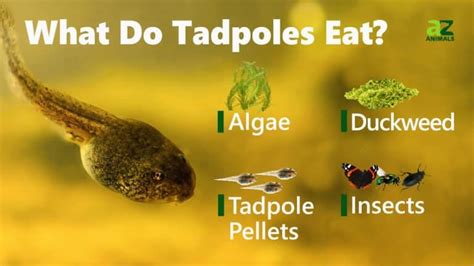Tadpoles, the larval stage of frogs and toads, undergo a fascinating transformation from aquatic, fish-like creatures to air-breathing, terrestrial animals. As they grow and develop, tadpoles require a diet rich in nutrients to fuel their metamorphosis. But what do tadpoles eat, and how do their dietary needs change as they mature?
In this article, we'll delve into the world of tadpole nutrition, exploring the various food sources that sustain these tiny creatures throughout their life cycle.
Tadpole Nutrition: An Overview
Tadpoles are primarily herbivores, feeding on a variety of aquatic plants and algae. Their diet consists of:
- Algae: Various species of algae, such as green algae and cyanobacteria, provide a rich source of nutrients for tadpoles.
- Aquatic plants: Tadpoles feed on aquatic plants, including duckweed, water lilies, and other submerged vegetation.
- Detritus: Decaying plant and animal matter, known as detritus, serves as a supplementary food source for tadpoles.
- Small invertebrates: As tadpoles grow, they may also consume small invertebrates, such as zooplankton and tiny crustaceans.
The Importance of Algae in Tadpole Diets
Algae play a crucial role in the diet of tadpoles, providing essential nutrients and energy. Algae are rich in:
- Protein: Algae are an excellent source of protein, which is vital for tadpole growth and development.
- Vitamins and minerals: Algae contain various vitamins and minerals, such as vitamin B12, iron, and zinc, which are essential for tadpole health.
- Fiber: Algae provide dietary fiber, which helps to support the digestive health of tadpoles.
Tadpole Diet Throughout Development
As tadpoles grow and mature, their dietary needs change. Here's a breakdown of their nutritional requirements at different stages of development:
- Early tadpole stage: Newly hatched tadpoles feed on the yolk sac, which provides them with nutrients. As they begin to swim and feed, they consume small amounts of algae and detritus.
- Mid-tadpole stage: As tadpoles grow, they start to feed on more substantial amounts of algae, aquatic plants, and detritus. They may also begin to consume small invertebrates.
- Late tadpole stage: In the final stages of development, tadpoles prepare for metamorphosis by consuming more protein-rich foods, such as small invertebrates and fish eggs.
Factors Affecting Tadpole Nutrition
Several factors can impact the nutrition of tadpoles, including:
- Water quality: Poor water quality can limit the availability of food sources and affect the overall health of tadpoles.
- Water temperature: Temperature affects the growth and development of tadpoles, as well as the availability of food sources.
- Predation: Predators, such as fish and other aquatic animals, can impact tadpole populations and affect their access to food.
Practical Applications of Tadpole Nutrition
Understanding the nutritional needs of tadpoles is essential for:
- Aquaculture: Knowledge of tadpole nutrition can inform the development of optimal feeding strategies for farmed tadpoles.
- Conservation: Understanding the dietary needs of tadpoles can help conservation efforts aimed at protecting endangered frog and toad species.
- Research: Studying tadpole nutrition can provide insights into the biology and ecology of these fascinating creatures.

Gallery of Tadpole-Related Images





Frequently Asked Questions
What do tadpoles eat?
+Tadpoles are primarily herbivores, feeding on algae, aquatic plants, and detritus. As they grow, they may also consume small invertebrates.
Why is algae important in tadpole diets?
+Algae provide essential nutrients, including protein, vitamins, and minerals, which are vital for tadpole growth and development.
How do environmental factors affect tadpole nutrition?
+Water quality, temperature, and predation can all impact the nutrition of tadpoles, affecting their access to food sources and overall health.
By understanding the dietary needs of tadpoles, we can gain a deeper appreciation for the biology and ecology of these fascinating creatures. Whether you're an aquaculturist, conservationist, or simply a nature enthusiast, knowledge of tadpole nutrition can inform your work and enhance your appreciation for the natural world.
